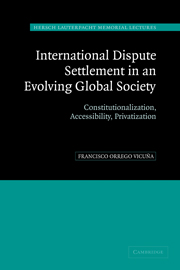 International Dispute Settlement in an Evolving Global Society
International Dispute Settlement in an Evolving Global Society Published online by Cambridge University Press: 04 August 2010
The changes in international society during the twentieth century have clearly established a pattern of evolution from the traditional forms of inter-state relations to an increasingly institutionalized community of nations. Hedley Bull identified five main features of international society as being characteristic of the Grotian tradition: the central place of natural law; the universality of international society; the role of individuals and non-state groups in such society; solidarism in the enforcement of rules; and the absence of international institutions. A number of these features are still shaping modern international society, thus providing a background of continuity to the changes taking place, changes which will now be reviewed.
Increasing institutionalization
Many changes have intervened in the organization of international society in the last few decades, while various aspects of the traditional arrangements continue to influence the shaping of this evolution. It should be noted first that, irrespective of past doctrinal discussions about natural and positive law, it is a fact that most contemporary developments are inspired by the need to ensure human freedom, dignity and welfare, aims inextricably related to our shared humanity. It is next apparent that international society adheres to the ideal of universality, despite powerful recent trends towards regionalism. Although this has prompted occasional tensions and competition between centralized international action and the role of regional organizations, universality and regionalism are generally complementary features of international society.
To save this book to your Kindle, first ensure [email protected] is added to your Approved Personal Document E-mail List under your Personal Document Settings on the Manage Your Content and Devices page of your Amazon account. Then enter the ‘name’ part of your Kindle email address below. Find out more about saving to your Kindle.
Note you can select to save to either the @free.kindle.com or @kindle.com variations. ‘@free.kindle.com’ emails are free but can only be saved to your device when it is connected to wi-fi. ‘@kindle.com’ emails can be delivered even when you are not connected to wi-fi, but note that service fees apply.
Find out more about the Kindle Personal Document Service.
To save content items to your account, please confirm that you agree to abide by our usage policies. If this is the first time you use this feature, you will be asked to authorise Cambridge Core to connect with your account. Find out more about saving content to Dropbox.
To save content items to your account, please confirm that you agree to abide by our usage policies. If this is the first time you use this feature, you will be asked to authorise Cambridge Core to connect with your account. Find out more about saving content to Google Drive.